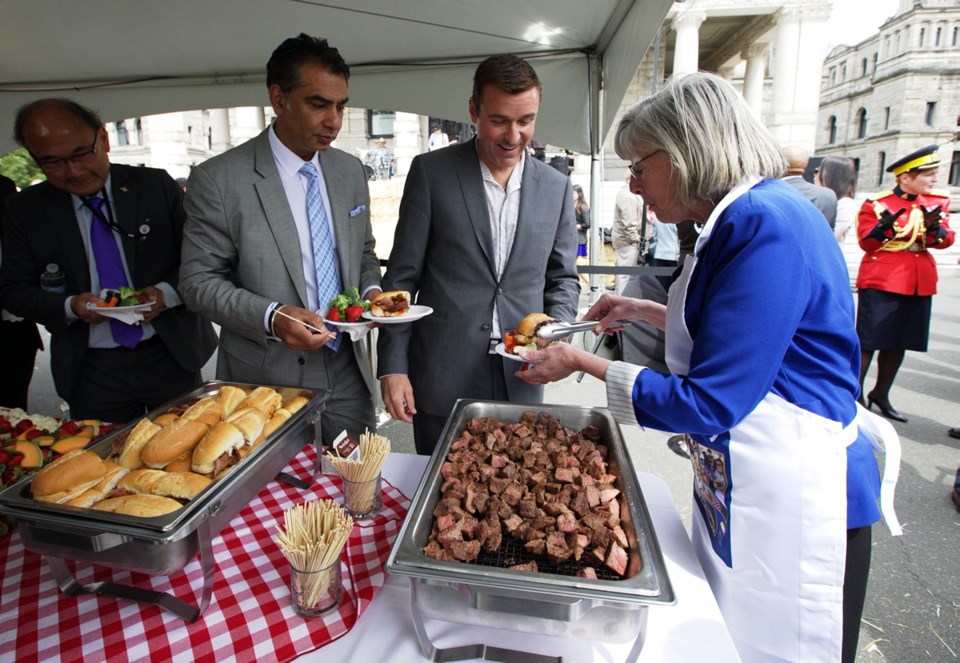B.C.’s ranchers celebrated beef during their annual barbeque at the legislature on Wednesday, amid increasing consumer demands that animals be raised in humane conditions and that healthy practices be followed.
Provincial Agriculture Minister Norm Letnick generated laughs during his opening remarks when he said: “Beef Day is all about supporting our local ranchers … you hear that Earls?”
Letnick was referring to the Earls restaurant chain’s decision to buy beef from a Kansas supplier of Certified Humane beef, a U.S.-based trademark. After a social-media uproar, the Vancouver-based company partly backed down, announcing that it would continue to buy Canadian beef, and that it planned to work with Canadian ranchers to find products that met its criteria.
Restaurants and producers are increasingly responding to consumers — especially millennials — who ask how animals are raised and about the industry’s ability to track animal history.
A&W Restaurants is using only beef raised without hormones or steroids, while McDonald’s has introduced a pilot project in which farms are audited for animal welfare.
Letnick said B.C. ranchers are “great stewards of the land. They are part of our agricultural drive to make sure we have food supplies secured in B.C. They provide great-tasting products.”
The B.C. beef industry said members of it meat-supplier network ensure animals are raised in smaller lots, with attention to quality and animal care at every stage of production.
In Canada, codes of practice for ranches are only guidelines that are not enforced by inspections. A number of federal and provincial agencies are responsible for animal health and food for human consumption.
Animal-welfare advocates argue more oversight is needed, calling on governments to enforce farm inspections and monitor humane treatment. Right now, it’s largely up to individual ranches.
The humane certification that Earls wanted is not part of a national program. Some Canadian ranches have obtained the designation, but others seeking some kind of certification turn to alternatives such as SPCA Certified.
The Canadian Cattlemen’s Association is expected to launch a new program next month called Verified Beef Production Plus, which will incorporate standards being developed by the Canadian Roundtable for Sustainable Beef for animal welfare, sustainability and biosecurity.
B.C. has 4,086 ranches with about 545,000 head of cattle, covering more than five million acres on private land and 21.5 million acres of Crown range land. About 66 per cent of the Agriculture Land Reserve area in B.C. is owned by ranches. B.C. beef is worth about $600 million a year to the province’s economy and the industry supports 8,700 jobs.
Brad Chappell of Heart of the Valley Farms in Courtenay said Vancouver Island is home to an estimated 5,000 to 6,000 head of cattle. Chappell raises Angus cattle as broodstock and is a founder of the Island Pastures brand, carried in local grocery stores. “We raise cattle with the pure intention of providing a fresh, clean, healthy, humanely raised animal for the protein product,” he said.
Chappell said Island buyers want to feel good about product quality and how an animal was raised. They also recognize that purchasing Island beef supports local farms, families and other businesses, he said.
Chappell is urging the province to designate Vancouver Island as a livestock prescribed area, which would allow for traceability of cattle.
Kevin Boon, general manager of the B.C. Cattlemen’s Association, said the existing ownership identification system covers most of Canada, except the Lower Mainland and Vancouver Island. He supports the two areas being covered by government identification legislation.
It proves ownership of an animal and requires forms to be completed ensuring an animal can be tracked.
“It is going to be crucial as we move into the full traceability for Canada,” Boon said.



